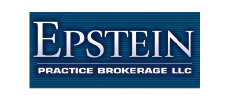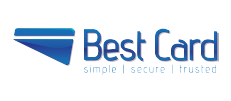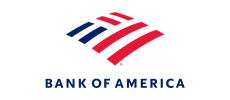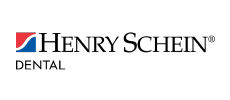Try the OmniChroma Family
Try a free sample of OMNICHROMA, OMNICHROMA Flow, or Flow BULK and see how one-shade composite can simplify your restorations.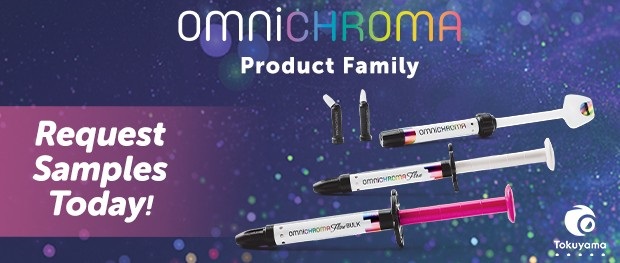
Volunteer Opportunity
The New Jersey Dental Foundation invites NJDA members to make a meaningful impact alongside TeamSmile and Colgate during the ShopRite LPGA Classic on May 29, 2026. Volunteer at the Seaview Hotel in Galloway, provide essential dental care to children in need, and earn 4 CE credits for your service.
Seller's Event | Bank of America
Planning your next chapter? This seminar is designed for established doctors, offering expert guidance to help you confidently transition your practice and prepare for retirement. Food and beverages provided.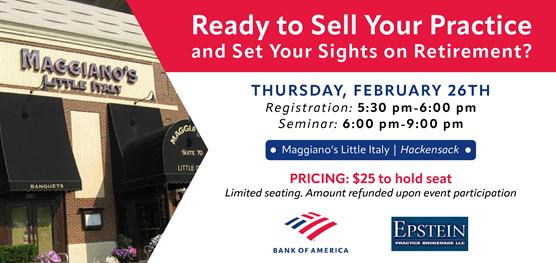
Help Patients Find You
The new AccessCare Directory, made possible by CareCredit, highlights NJDA member-dentists who offer special services such as sedation, homebound treatment, senior discounts, and more. Get on the list!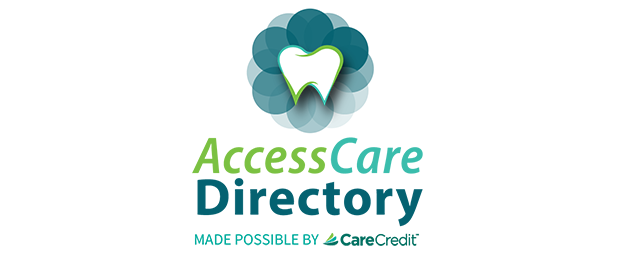
The Wellness Summit
This intimate summit brings together dental professionals from across New Jersey for expert-led sessions, interactive discussions, and movement-based breaks focused on well-being, resilience, and burnout prevention. Attendees will gain practical tools to support their mental, emotional, and physical health in a supportive, judgment-free environment.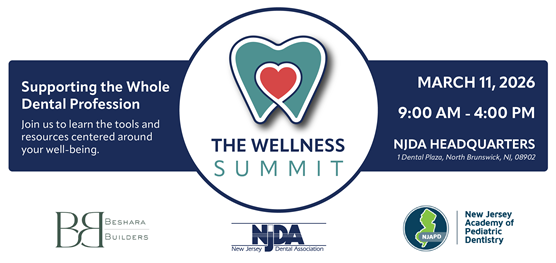
Renew Your Membership
Keep your support and member resources through 2026.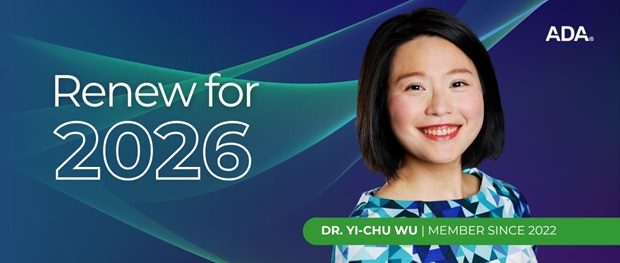
REGISTRATION OPEN!
We are excited to announce that NJDA's Annual Convention will return to Bridgewater on May 1-2, 2026! Registration is now open for this 2-day Convention that will truly be the place to be for all New Jersey dental professionals!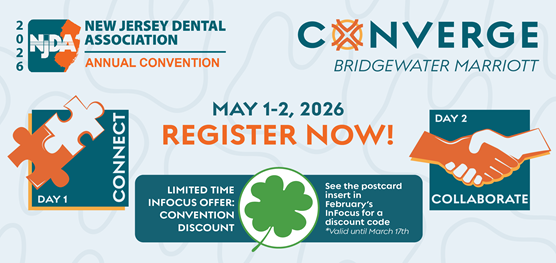
Celebrate NJDA President Dr. Amit Vora
Our yearly NJDA Celebration will cap off Day 1 of the Annual Convention and will take place at the Bridgewater Manor, located just seven minutes from the Convention site. We'll be celebrating New Jersey dentistry and our guest of honor, President Dr. Amit Vora. RSVP to join the celebration!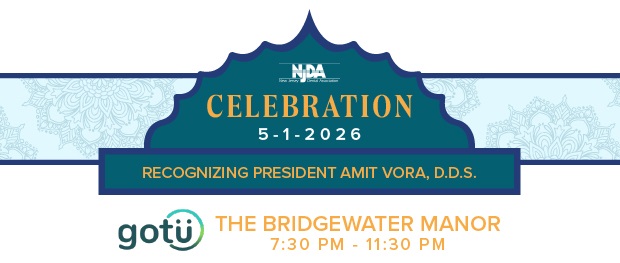
Enhance Your Membership
Customize your 2026 membership by adding the virtual License Requirements Series, our Practice Solutions bundle, or the new Dental Impact Series!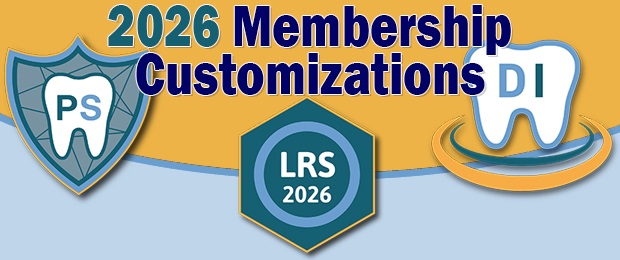
Helping Members Succeed
The New Jersey Dental Association is the voice of the dental profession and a strong proponent of oral health in the state. Members are part of a vibrant community of dentists encompassing 12 local dental societies as well as the American Dental Association. Members engage in educational programs, have access to dentist-centric relationships and tools to navigate the business of dentistry and their careers, as well as benefit from dedicated advocacy that protects the interests of the profession. The organization is run by member-dentists with the support of a team of professionals at NJDA Headquarters. NJDA members never practice alone!
UPCOMING EVENTS
DENTAL NEWS AND NOTES
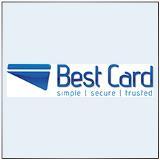
ABC’S of Credit Card Processing
With just a little bit of information, you’ll be able to understand where the costs come from and what they should be.
What Should it Cost?
Rather than look at any individual card (which is how many companies will try to claim low costs) it’s best to look at your overall effective rate; take the total amount paid in all rates and fees and divide that by the total amount run in sales for the month. Example: $420 in fees ÷ $20,000 processed = 0.021, or 2.1%. Best Card’s average dental office pays an effective rate of 2.1%, which means they pay just $2.10 to process $100 in sales.
Understanding the Basics
Anytime you run a card there is an exact fee that has to be paid to the card brands depending on the type of card run (the system automatically detects the card type) and the method in which the payment was run. This cost is known as Interchange and this is the direct cost that any credit card processor has to pay; there are more than 1,200 different cards, each with their own Interchange cost. In this way all processors have the same “price floor.” It is what is charged on top of this where processing companies compete. That said, there are specific things that you can do in the office to minimize your Interchange costs and save additional money, including:
- Have your staff ask for debit cards. Debit cards are far cheaper than credit cards to run (there’s no risk to the card company that the cardholder won’t pay their monthly bill and there are no perks/rewards to pay). Debit cards can cost a fraction of credit card fees.
- Swipe the card or use the chip for the lowest rates rather than hand-keying in the card number. If the card is present, there is a lower risk of fraud which results in the lowest possible interchange cost on any type of card processed.
- When you must process card-not-present transactions (keyed cards), make sure to enter the street address and zip code associated with the card to avoid additional fees and get a slightly lower rate.
- Get PCI compliant! The PCI Security Council mandates annual completion of a self-assessment questionnaire (SAQ), and quarterly network scans if using ethernet/online connectivity. Best Card maintains >90% compliance as we send emails and assist in getting merchants compliant. We prepare thousands of cost comparisons and see processors charge $18.95-$39+ per month in non-compliance fees on approximately 70% of analysis requests, and this is what the industry as a whole is reporting. Get compliant!
What are these Other Costs?
In addition to the Interchange costs, there are also Card Brand Fees, which are many small fees charged directly by the card brands for access to their networks (Dues and Assessments, FANF, data kilobyte usage, etc). While all processors pay those same fees, many processors surcharge above the actual cost. Best Card passes them through exactly at cost.
Just because all credit card processors have the same costs doesn’t mean that they charge their customers the same price for their services. There are a few popular pricing models:
- lInterchange Plus: Pass through all card costs with a fixed surcharge percentage (and sometimes a per-transaction fee). We are seeing more processors (especially those with autopost of payments into dental software) add additional surcharges to some or all cards to boost their profit. Best Card offers any endorsing association member Interchange + 0.30% + $0 per transaction, which is significantly below the industry average.
- lTiered: Group all cards into 3-6 “tiers” based on similarly priced cards. Some processors may have a base rate and surcharge for “Non-Qualified” cards that have higher Interchange costs. If you see Qualified, Mid-Qualified, or Non-Qualified on your statement, you’re likely on Tiered pricing.
- lFlat rate: Charge one fee for all cards, or sometimes a card present fee and a more expensive card-not-present fee. These rates can be very high because they have to make sure the processor isn’t losing money if there are many transactions with higher cost cards.
- lConvenience Fee: While there are a couple variations, this includes having your patients pay the fee for accepting cards, generally at very high rates well above your normal cost. This not only has extensive reporting requirements with the card brands, but some states (including Colorado) do not allow passing a surcharge onto the customer and patients tend to respond negatively.
Which One is Best?
While any pricing method can be competitive, Interchange and Tiered are usually the most competitive pricing methods, assuming you have an ethical processor. If your processor is looking for ways to boost their profit at your expense, then any system might be more to their benefit than yours.
It’s About Who You Work With!
Best Card is endorsed by 25 state dental associations for credit card processing because they offer exclusive rates for members, have excellent customer service, and are committed to keeping costs low for dental offices. On the rates that Best Card guarantees to all association members, the average dental office saves $2,468 (24%) a year. They also have software options that can automatically post payments into most popular dental software. If you’d like to see what they can save your practice, email a recent statement to CompareRates@BestCardTeam.com or fax it to them at 866-717-7247. Questions? They’d love to answer your questions so feel free to call them toll free at 877-739-3952 or visit www.BestCardTeam.com.
Contact Us
Phone: 732-821-9400 or dial the Staff Directly
Fax: 732-821-1082 | Email: info@njda.org | Follow us @NJDentalAssoc
One Dental Plaza, North Brunswick, NJ 08902




